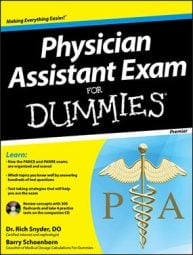Diastolic heart failure is a problem with the heart’s relaxing. Your Physician Assistant Exam will ask you questions about its causes and treatments.
Common causes include ischemia and hypertension. A major cause is obesity. Diastolic dysfunction, especially with the current obesity epidemic in the United States, is more common than systolic dysfunction, although the two can coexist. On an echocardiogram, the cardiologist can diagnose diastolic dysfunction/diastolic heart failure based on the inability of the heart to relax.
The mainstay treatment medications for diastolic heart failure are beta blockers and calcium channel blockers. They help the heart relax.
You’re evaluating a 77-year-old man who presents to the hospital with shortness of breath. A chest radiograph shows pulmonary edema. His blood pressure is 128/66 mmHg, and his oxygenation level is 96 percent on 6 liters via nasal cannula. You order a BNP level, which is 2,000 pg/mL. The ECG shows normal sinus rhythm at 68 beats per minute and no acute ST-T wave changes.
Which of the following combinations of medications would you administer to this person?
(A) Furosemide (Lasix) and heparin
(B) Aspirin and heparin
(C) Furosemide (Lasix) and hydrochlorothiazide
(D) Nitroglycerin and heparin
(E) Nitroglycerin and furosemide (Lasix)
The correct answer is Choice (E), nitroglycerin and furosemide. This man has a chest radiograph that shows pulmonary edema. The treatment for acute pulmonary edema is oxygen, furosemide, nitroglycerin, and maybe morphine. The nitroglycerin is a potent vasodilator and can ease the work of breathing in acute pulmonary edema/decompensated congestive heart failure.
Choices (B) and (D) would be used in the treatment of acute coronary syndrome. The meds in Choice (C) aren’t really given together. Furosemide and heparin, Choice (A), would be given together if the person had CHF in the setting of acute coronary syndrome (an NSTEMI, for example). Clinically, in the setting of CHF due to acute coronary syndrome, other medications would be given, including aspirin and nitroglycerin.
Note the inclusion of the brain (B-type) natriuretic peptide (BNP) in the question. It’s secreted by the ventricles and can be elevated chronically in states of ventricular stretch, such as chronic CHF or a cardiomyopathy. In acute decompensated CHF, these levels can be elevated from baseline. Clinicians can trend these over time.

